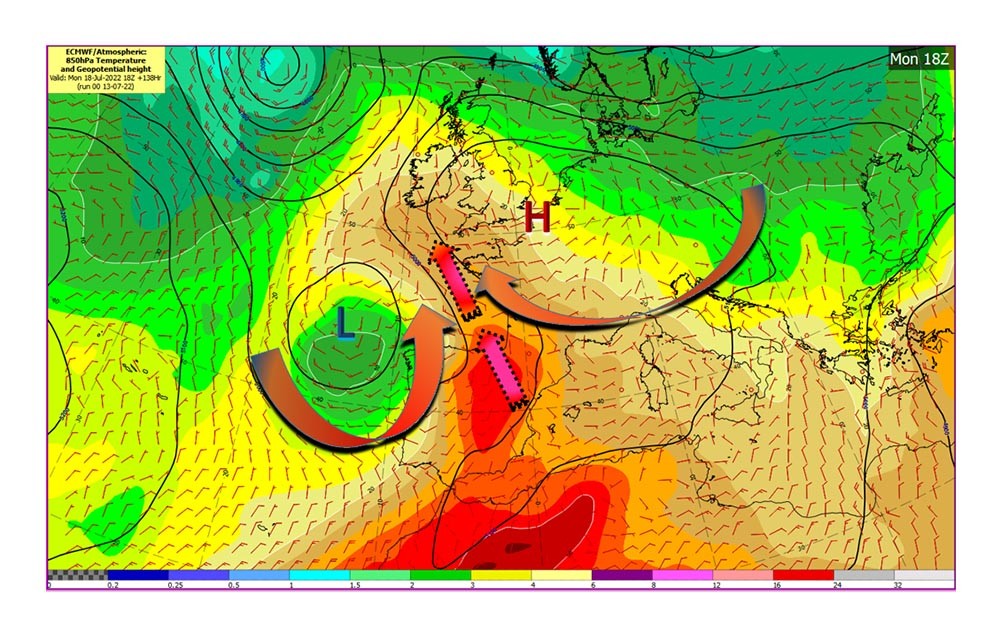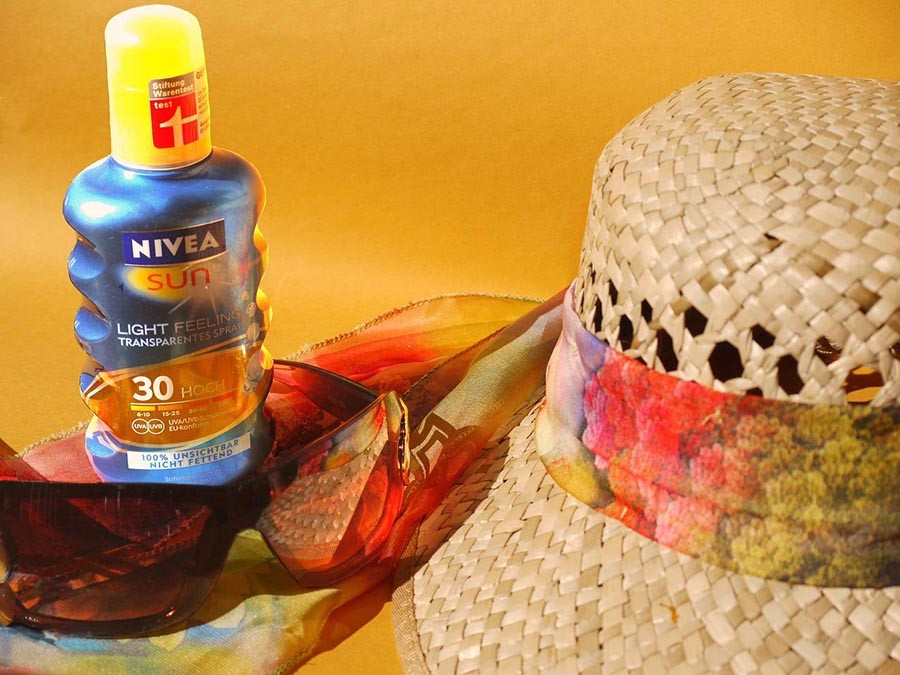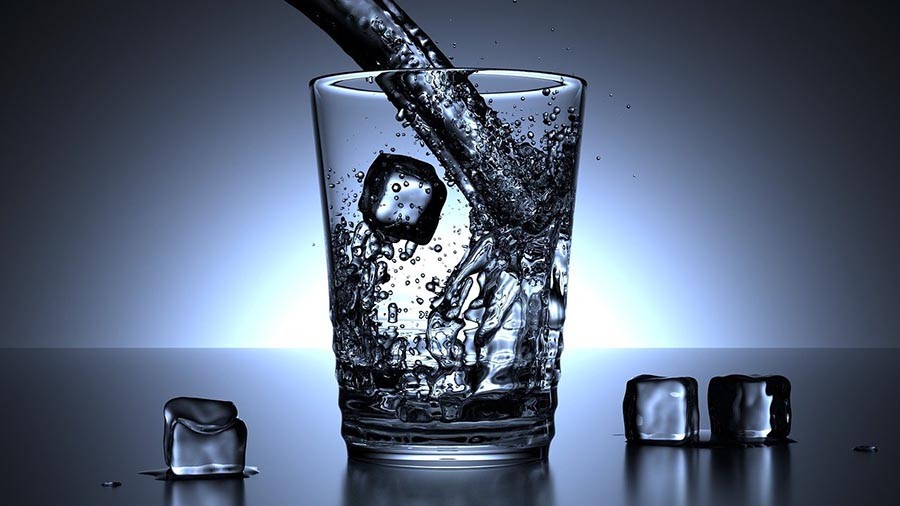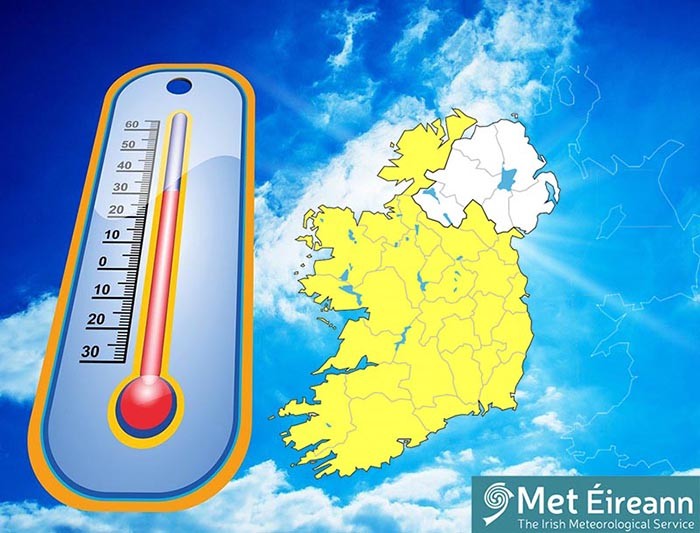Live Updates
Friday, 10.25am
Further to its previous High Temperature Advisory, Met Éireann has now issue a Status Yellow High Temperature Warning.
Met Éireann says: “On Sunday, Monday and Tuesday exceptionally warm weather will occur over Ireland with daytime temperatures of 25 to 30 degrees generally and possibly up to 32 degrees in places on Monday. Night time temperatures will range from 15 to 20 degrees.”
The weather service says the possible impacts include:
• Heat stress, especially for the more vulnerable of the population
• High Solar UV index
• Risk of water related incidents
See Fire danger notice and full safety advice on www.gov.ie/summerready
The warning, issued this morning, will be valid from 06:00am Sunday 17/07/2022 to 9:00pm Tuesday 19/07/2022.

Met Éireann has issued a ‘High Temperature Advisory’ for Ireland for next week.
The weather service has said Ireland will experience “a hot spell Sunday and into early next week.”
Day time temperatures will widely reach the high twenties, possibly exceeding 30 degrees in some locations. Remaining uncomfortably warm overnight too. Updates to follow.
The advisory will be valid from 3.00pm until midnight on Wednesday July 20th.
Sweltering heat forecast from 15-19th July – what to expect…

Top tips for keeping cool
- It is best to avoid getting too hot in the first place. Stay tuned to the weather forecast.
- Remember to think of those who may be more at risk from the effects of heat.
- If you’re planning to travel, check the forecast at your destination.
- Learn how to keep cool and safe at home
Stay out of the heat
- Keep out of the sun between 11am and 3pm.
- If you have to go out in the heat, walk in the shade, apply sunscreen with both UVA and UVB protection.
- Avoid extreme physical exertion. If you can’t avoid strenuous outdoor activity, like sport, DIY or gardening, keep it for cooler parts of the day, like early morning or evening.
- Wear light, loose-fitting cotton clothes and a hat to shade face, neck and ears.
- Wear wraparound sun glasses with UV protection.
- Wear sun protection factor: factor 30 or over with a 4 or 5 Star UVA rating on any areas that cannot be covered by clothing and a hat.
- Young children, especially babies, and the elderly are more susceptible to sun damage so be extra careful.

Cool yourself down
- Drink plenty of cold drinks, and avoid excess alcohol, caffeine and hot drinks.
- Eat cold foods, particularly salads and fruit with a high water content. Bananas, orange juice and occasional salty snacks can also help replace salts lost due to sweating.
- Take a cool shower, bath or body wash.
- Sprinkle water over the skin or clothing, or keep a damp cloth on the back of your neck.
Keep your environment cool
- Keep your living space cool. This is especially important for infants, the elderly or those with chronic health conditions or those who can’t look after themselves.
- Keep windows that are exposed to the sun closed during the day, and open windows at night when the temperature has dropped.
- Close curtains that receive morning or afternoon sun.
- Turn off non-essential lights and electrical equipment – they generate heat.
- Keep plants and bowls of water in the house as evaporation helps cool the air.
- If possible, move into a cooler room, especially for sleeping.
- Electric fans can help but only if temperature is below 35C.
Look out for others
- Keep an eye on isolated, elderly, ill or very young people and make sure they are able to keep cool.
- Ensure that babies, children or elderly people are not left alone in stationary cars.
- Check on elderly or sick neighbours, family or friends every day during a heat wave.
- Be alert and call for medical support if someone is unwell.
Advice on medicines
- Many prescription medicines can reduce your tolerance of heat. You should keep taking your medicines, but take extra care to keep cool.
- Danger symptoms to watch out for in hot weather include: feeling faint and dizzy, short of breath, vomiting or increasing confusion. Take immediate action if – danger symptoms of heatstroke are present: Cool down as quickly as possible. However do not take aspirin or paracetamol – this can make you worse. Do however carry on taking all other prescribed medicines. Seek further advice from a doctor, or ring 999 if the person has collapsed.
- Keep medicines below 25°C or in the refrigerator (read the storage instructions on the packaging).
- Seek medical advice if you are suffering from a chronic medical condition or taking multiple medications.
If you or others feel unwell
- Try to get help if you feel dizzy, weak, anxious or have intense thirst and headache; move to a cool place as soon as possible and measure your body temperature.
- Drink some water or fruit juice to rehydrate.
- Rest immediately in a cool place if you have painful muscular cramps (particularly in the legs, arms or abdomen, in many cases after sustained exercise during very hot weather), and drink oral rehydration solutions containing electrolytes.
- Seek medical attention as needed if heat cramps last more than one hour.
- Consult your doctor if you feel unusual symptoms or if symptoms persist.
Seek advice if you have any concerns
- Contact your doctor or a pharmacist if you are worried about your health during a heat wave, especially if you are taking medication, if you feel unwell or have any unusual symptoms.
- Watch for cramp in your arms, legs or stomach, feelings of mild confusion, weakness or problems sleeping.
- If you have these symptoms, rest for several hours, keep cool and drink water or fruit juice. Seek medical advice if they get worse or don’t go away.
If you suspect someone has heatstroke
- Remember, heatstroke can kill. It can develop very suddenly, and rapidly lead to unconsciousness. If you suspect someone has heatstroke, call 999 immediately.
- While waiting for the ambulance, move the person somewhere cooler if possible, increase ventilation by opening windows or using a fan and cool the affected person as quickly as possibly by loosening their clothes, sprinkling them with cold water or wrapping them in a damp sheet. If they are conscious, give them water or fruit juice to drink.
- Encourage them to drink fluids, if they are conscious
- DO NOT give them aspirin or paracetamol if you suspect that they have heatstroke.
